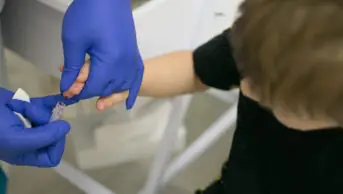
Alfred Pasieka / Science Photo Library
Type 1 diabetes is an autoimmune disease that leads to destruction of the pancreatic β-cells. A revolutionary new treatment may be on the horizon after US researchers managed to create human insulin-producing cells (IPCs) that were able to control glucose levels when transplanted in vivo.
Nicholas Zavazava, from the University of Iowa, and colleagues took induced pluripotent stem (iPS) cells from human skin cells and, using a series of pancreatic growth factors, caused them to differentiate into IPCs. The IPCs were then transplanted into the kidneys of diabetic mice, where they were able to secrete insulin and glucagon, to develop their own blood supply and to cause blood glucose levels in the mice to gradually decline.
“iPS cells might be a novel option for the treatment of type 1 diabetes,” the researchers conclude in PloS One (online, 28 January 2015)[1]
.


